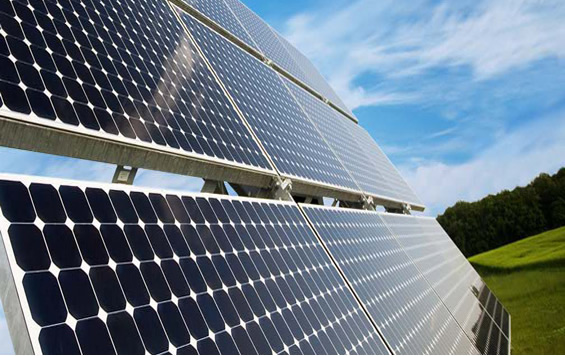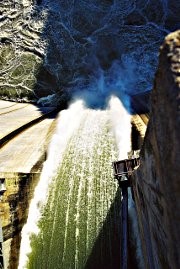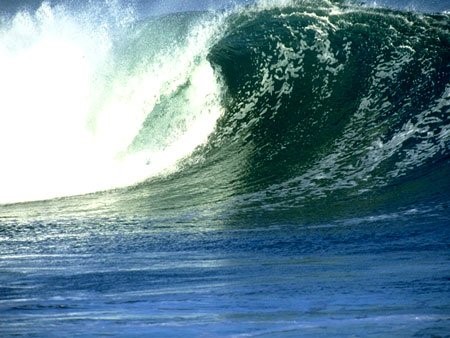Portugal is in a strategically privileged position to be a pioneer in the reduction of the energetically dependency in sources of non renewable energies, putting the country in advantage for demand of a sustainable development based in sources of alternative energy.

The different sources of energy in Portugal
Portugal is a poor country regarding the availability of energy sources more vulgar called non-renewable sources, since it has no oil wells, coal mines and gas deposits. However, considering the renewable energy the country has enormous potential that can and should be exploited, not only with a view to reduce dependence on foreign energy but also the environmental point of view, in order not to increase or even to reduce the consumption of energy that cause emissions of greenhouse gases - laid down in the Kyoto Protocol and a set of communitarian directives - in order to combat climate change.
Indeed, Portugal has a relatively dense hydrographic network, a high average annual sun exposure, and offers a wide seafront benefiting from the Atlantic winds, which gives it the ability to harness the potential energy of water, light, waves and Atlantic wind. These unique conditions allow the country to take advantage of alternative forms of energy to fossil fuel consumption. Thus, Portugal is in a unique position not only to compensate for the deficit of natural non-renewable energy sources but also to be a pioneer in reducing energy dependence on non-renewable energy sources and pollutants, placing themselves at the forefront of the demand of a sustainable development.
The Portuguese goals for the Renewable Energy
Aware of its potential as regards the production of energy from renewable sources, the country has made a brave commitment towards the nations of the European Union by setting an ambitious goal with regard to reducing energy dependence on fossil fuels. Indeed, Portugal was proposed to, in 2010, have 39% of electricity generated from renewable sources (European Directive 2001/77/EC), the 3rd largest contribution in the EU15. Two years later were established individual goals to produce clean energy from the various renewable sources, like presented in the National Strategy for Energy approved by Resolution of the Council of Ministers. In this Strategy its planned to strengthen the renewable energy that:
• The target for the production of electricity from renewable energy goes from 39% to 45% of consumption in 2010;
• Biofuels used in transport should reach 10% of road fuel consumption in 2010.

In this sense , and for the different sources of renewable energy is expected :
• Wind Energy: Increase in the goal of 1,950 MW installed capacity in 2012 (new total of 5,100 MW with an increase of 600 MW by upgrading equipment) and promote the creation of technology clusters and investment associated with wind energy;
• Hydropower: Investing in short-term investments in anticipation of power enhancement in existing hydropower infrastructure in order to achieve the target of 5,575 MW of installed hydropower capacity in 2010 (575 MW more than predicted by previous energy policies);
• Bioenergy: Increase by 100 MW order of installed capacity in 2010 (new total of 250MW - 67% increase), promoting close coordination with regional forest resources and potential and policies against risk of fire;
• Photovoltaic Energy: Ensure effective compliance targets (eg construction of the largest photovoltaic plant in the world - central Moura) and ensure a link with the policies and goals of microgeneration;
• Wave Energy: Increase capacity by 200 MW through the creation of a Pilot Zone with total exploration potential of up to 250 MW of new prototypes of industrial technological development and pre - commercial emerging;
• Biofuels: Set goal of 10 % of road fuels from biofuels (10 years earlier than the target of the European Union) and promote domestic agriculture support through the ISP exemption for road fuels to ensure its incorporation;
• Biogas: Set goals and plan of action from a perspective not previously contemplated, establishing a goal of 100 MW of installed units in the anaerobic treatment of waste ;
• Micro - generation: Introduce new strand of renewable promoting a program to install 50,000 systems by 2010, to encourage the installation of Solar Hot Water in existing homes

If this will be possible and the proposed goals would be achieved, this are good news for the Portuguese families, once that all can benefit from cheapest and ecological types of energy. Some national companies started to give some benefits to families that wanted to invest some money in solar panels and produce solar energy, for their own benefit and also to sell. This solution was considered very good, especially in the south, where the sun rises almost all year and in 4 or 5 years all the investment was paid.